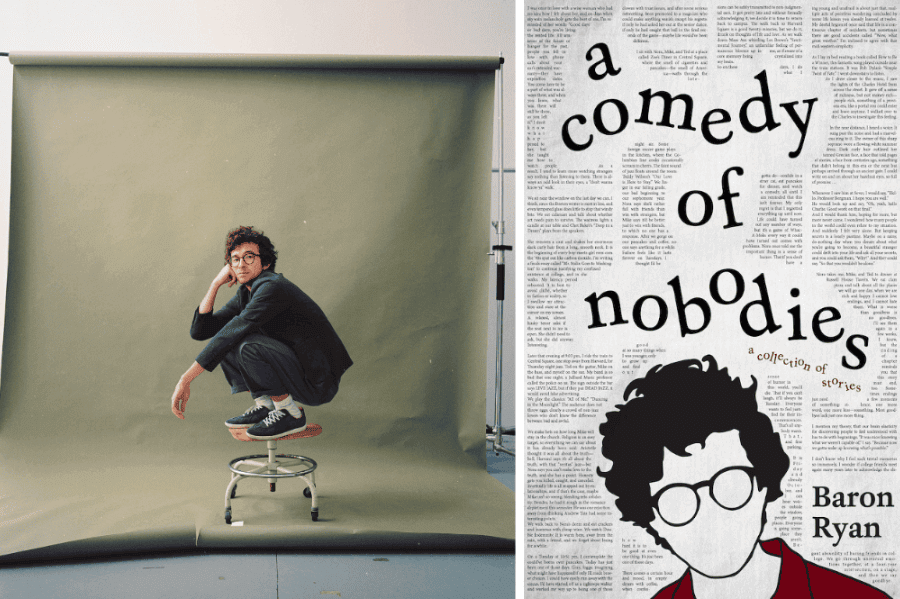Book review: A Comedy of Nobodies: A Collection of Stories by Baron Ryan: TikTok comedy doesn’t fare well in viral star’s debut – Art


Courtesy of Blackstone Publishing
Baron Ryan, a TikTok star with an impressive 2.8 million followers, has gained a loyal audience with his video sketches.
His TikToks, which Ryan stars in, edits, writes, and directs, consist of philosophical conversations about growing up. These conversational bits are scattered throughout his debut novel, A Comedy of Nobodies: A Collection of Storiesand yet there are only occasional hints of Ryan’s comedic talent throughout the story.
The book’s main character, Charlie (possibly an insertion by Ryan himself), is a college student at Harvard. He hangs out with his three friends in real-life cafes and restaurants in Cambridge. The stories are consecutive, each representing a month in Charlie’s fall semester. The book follows the same characters and reads like a novel rather than individual stories. Charlie’s prescient introspections accompanied by the comical situations he finds himself in make for a pleasant, light read that resembles a novel adaptation of a cheesy romantic comedy. Still, there is a comedic disconnect due to the lack of complex characterization.
For example, in the story “The Last American Pie,” Charlie’s jazz band decides to play “American Pie” instead of the national anthem at the Harvard-Yale hockey game. “I suddenly realize what a bad idea this is. For God’s sake, what are we thinking? But then I think of Nantucket,” Charlie says, hoping to keep his favorite Harvard couple together by playing their song “American Pie.” By keeping this couple together, he believes he will be invited to their Thanksgiving feast in Nantucket, where the wealth that surrounds him would comfort him and spare him from having to confront his family’s poverty. After this traumatic event, he never reflects on his actions or the intention behind them. Charlie, a lower/middle class student at Harvard, is the foundation for a complex character, yet the reader never witnesses Charlie’s emotional turmoil over this event. Throughout the book, Charlie’s stagnation is frustrating and leaves the reader yearning for a character that grows.
Another example is the story “Getting There.” Charlie’s babysitting duties clash with his dinner date. He enlists Nora, his best friend and fellow Harvard student, to help him. As he is about to meet his date, the fire alarm goes off and he must frantically find a place for Nora and the child until the fire department clears the area. Charlie suggests IHOP and Nora responds (with great comedic timing), “What kind of man are you to abandon your child and your co-babysitter at the International House of Pancakes?” Nora is direct and often acts as a vessel of the “tough love” Charlie desperately needs—an excellent contrast to Charlie’s avoidant nature. Throughout the novel, Nora is the underdeveloped supporting character. Charlie uses her for a fresh female perspective and often dismisses her advice and experiences, yet Nora’s story has more potential despite her supporting status.
Ryan’s TikTok channel boasts philosophical arguments, but when you flesh them out, they seem like cliches. Charlie’s musings are a collection of repetitive words (“My only regret is that I’ve regretted everything so far,” “The craziest thing you can do with your life is not do the craziest thing”) or the loose foundation of existential philosophical thoughts (“What’s the point if we’re all doomed to nothingness? I don’t care how we use our brains, the point is that we use them and nobody knows the rest”). When Charlie’s inner monologue tries to be profound, it reads like “Philosophy for Dummies,” a self-examination not unlike that of a stoner.
However, there are moments when Ryan’s comedic strengths are on full display. One story that stands out in particular is “The Vent,” a compelling tale in which Charlie and his friend follow a beautiful Russian woman into a hotel. When they realize they’re about to get beat up, they masterfully create a ton of distractions. In this story, Ryan introduces a new setting and higher stakes. The reader can finally root for someone while sitting on the edge of their seat. The dialogue between the men reads like a great movie script. Halfway through the novel, I finally understood Ryan’s comedic strengths.
At the end, A comedy of nobodies takes its title too seriously. The comedy is there in spurts, but ultimately none of the characters had enough depth to be memorable or dimension to be unlikable. So in the end, Baron Ryan may have succeeded in creating what he set out to create – a comedy about literal nobodies.
Related Posts

The daily horoscope for Leo today, June 25, 2024, predicts love experiences | Astrology

Review of “The House of Beckham” by Tom Bower – a sex-obsessed assassination work | Biographies

